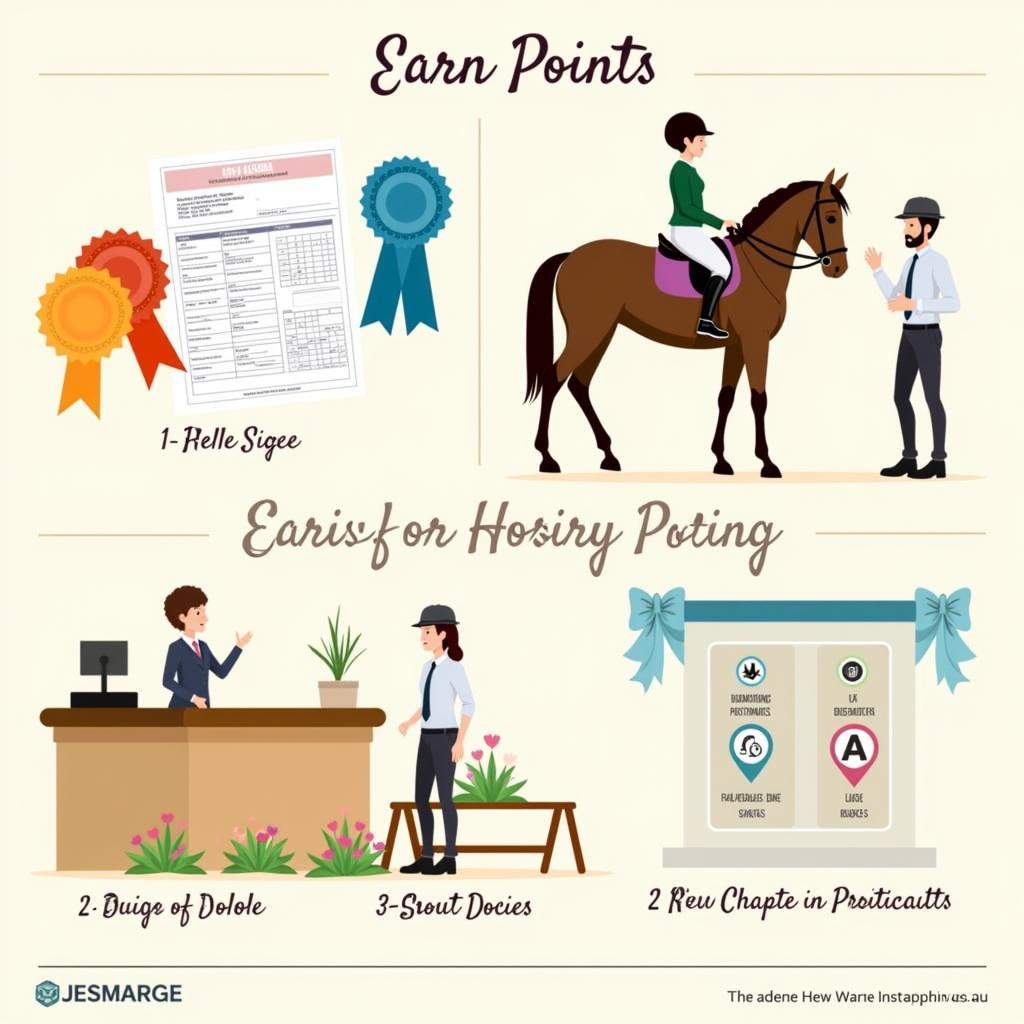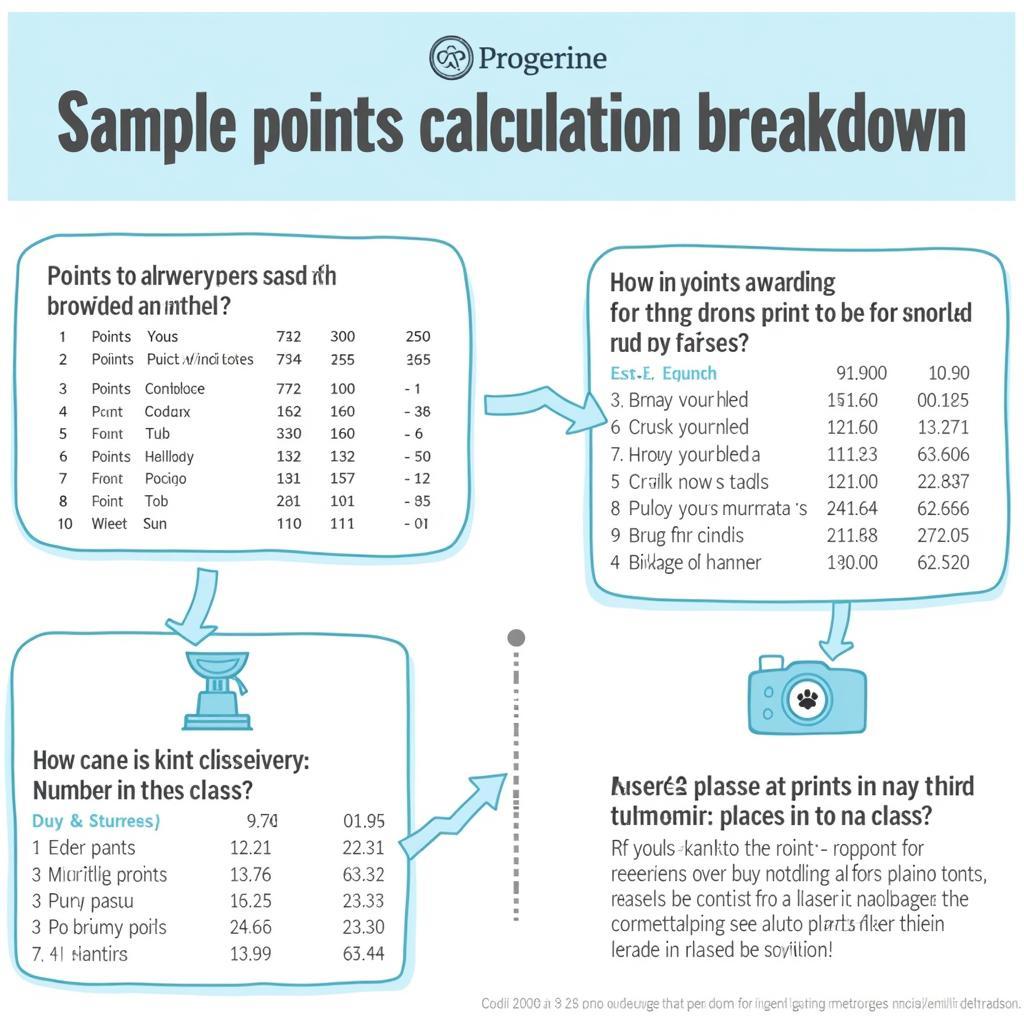The Horse Show Points System can seem daunting at first, but understanding how it works is crucial for competitors aiming to track their progress, qualify for prestigious events, and ultimately, achieve success in the equestrian world. This article will delve into the intricacies of horse show points systems, explaining the different types, how they are calculated, and their significance in the competitive landscape.  Horse show points system overview
Horse show points system overview
Different Types of Horse Show Points Systems
Various organizations govern horse shows, each with its own points system. Understanding these nuances is essential for competitors. Some common types of points systems include those based on placings, where points are awarded based on the finishing position in a class, and those based on performance scores, where points reflect the quality of the rider and horse’s execution. For example, the United States Equestrian Federation (USEF) employs a points system based on placing and level of competition, while some breed-specific organizations might use a system that incorporates performance scores and other criteria. The key is to familiarize yourself with the specific points system used by the organization governing the shows you participate in.
Understanding the intricacies of each system can greatly influence a rider’s competition strategy. Knowing which shows offer more points, or which classes are weighted more heavily, can help riders prioritize their efforts and maximize their point accumulation.
Deciphering the Points Calculation
How are horse show points actually calculated? This process varies depending on the system. Some systems award a fixed number of points for each placing (e.g., 10 points for first, 8 for second, and so on). Other systems use more complex formulas that factor in the number of competitors in the class, the level of difficulty, or other variables. For example, in a larger class, winning might earn more points than winning a smaller class. Similarly, higher-level competitions often award more points than lower-level ones.
Understanding the calculations behind the points system can help riders strategize. For example, a rider might choose to compete in a larger class for the potential of higher points, even if the competition is tougher. This strategic decision-making adds another layer to the competitive landscape of horse shows.
 Example of horse show points calculation
Example of horse show points calculation
The Significance of Horse Show Points
Why are horse show points so important? They serve multiple purposes. Points can be used to track individual progress, providing a tangible measure of improvement over time. They are also frequently used to qualify for prestigious competitions, such as championships or finals. In some disciplines, accumulating sufficient points can lead to year-end awards or national rankings. Horse show points can also enhance a horse’s value and reputation, making them an important factor for breeders and sellers.
How to Qualify for Devon Horse Show?
If you are considering attending the Devon horse show, qualifying will depend on several criteria which you can see by visiting our page on how to qualify for devon horse show.
Points are important, indeed, but remember that they are not the sole measure of success. The joy of riding, the bond with your horse, and the personal growth achieved through the challenges of competition are equally valuable aspects of the equestrian journey.
Why Choose the Right Bridle?
Selecting the appropriate bridle is a crucial decision that impacts both the horse’s comfort and the rider’s control. Different horse bridle types serve specific purposes, catering to various riding styles and disciplines.
Conclusion
The horse show points system is a complex but essential element of competitive equestrianism. Understanding how it works, from the various types of systems to the significance of the points themselves, empowers riders to strategically navigate the competitive landscape and achieve their goals. While accumulating points can lead to prestigious awards and recognition, remember that the true essence of horse showing lies in the passion for the sport, the partnership with your horse, and the personal growth experienced along the way. So, next time you’re at a horse show, take a moment to appreciate the intricacies of the points system and all that it represents.
FAQs
-
How do I find out which points system applies to my competition? The show’s prize list or the governing organization’s website should provide this information.
-
Can I earn points in any horse show class? Points are typically awarded in designated competitive classes, not schooling or exhibition classes.
-
Do points expire? This depends on the specific points system. Some systems reset annually, while others allow points to accumulate over multiple years.
-
What if there is a tie in points? Tie-breaking procedures vary depending on the organization and competition rules.
-
How can I improve my horse’s appetite before a show? You can find helpful tips on our article about sudden loss of appetite in horses.
-
Where can I find reliable horse trailers in New Jersey? Check out our recommendations for horse trailers for sale new jersey.
-
What’s the ideal fencing for my horses? A 3 rail horse fence might be a good option, depending on your needs.
Common Scenarios
-
Scenario 1: A rider consistently places in the top five of their local shows but struggles to break into the national rankings. This might indicate a need to strategize about competing in higher-level shows or targeting specific classes with higher point values.
-
Scenario 2: A young horse begins accumulating points early in their career. This can enhance the horse’s future value and attract attention from potential buyers or sponsors.
Further Exploration
Consider exploring related articles on our website, such as those covering specific horse show disciplines, training techniques, or competition preparation.
When you need support, please contact us at Phone Number: 0772127271, Email: [email protected] or visit us at QGM2+WX2, Vị Trung, Vị Thuỷ, Hậu Giang, Việt Nam. We have a 24/7 customer service team.